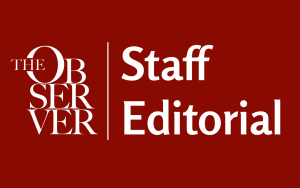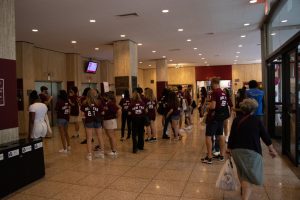Students Need Free and Available Testing
October 8, 2021
You may have seen the COVID-19 testing tent situated next to the halal cart. The tent is so clearly visible by the main entrance that it appears Fordham is sending a message: COVID-19 testing is vital to protecting the health of the community.
However, the tent is not affiliated with Fordham, it’s run by LabQ Diagnostics, a private company. Meanwhile, Fordham’s own testing center lies within its walls, understaffed and obscured by reduced hours. Students have reported substandard and confusing communication surrounding contact tracing, revealing a poor execution within the protection of the safety and health of the campus community.
This fall, Fordham has not required surveillance testing, a change from the past two semesters. The testing center at Lincoln Center is only open for contact traced or exposed individuals on Mondays and Thursdays between 10 a.m. and 3 p.m., as opposed to last year’s 9 a.m. to 4 p.m. schedule on all weekdays. There are more people on campus yet far fewer hours to be tested. Though 97.33% of the graduate and undergraduates population are fully vaccinated, the highly contagious Delta variant is still spreading around the city and affecting vaccinated people. Tests are only provided to those who have symptoms, have vaccination exemptions, were contact-traced or were exposed — and prior to Sept. 20, all PCR tests had a $35 charge for students who may have been exposed.
If we want to lower our case total on all campuses, the easiest way to know the full extent of cases is to return to free testing of all students, not just those who are symptomatic or have been exposed.
The regular testing last year did, however, put a strain on University Health Services (UHS). Nurses were required to work full days at the testing center, away from patients in the health center. Fordham also hired EMTs from Fordham University Emergency Medical Services (FUEMS) to take some weight off of UHS.
This year, with far more students on campus, UHS has not hired additional FUEMS EMTs to work at the testing center, and unlike last year, those who are working there can only register students, not administer tests.
Students have received mixed communications from Fordham’s contact tracers. While some may receive a call, others receive a variety of different emails. There is no clear pattern as to how we should expect to be alerted; Fordham’s severe lack of proper contact tracing necessitates the return of free and readily available on-campus testing for those who want one.
The vaccine mandate eases some anxiety; however, that does not mean it is time for Fordham to neglect its responsibility to keeping students safe from COVID-19.
We have taken it upon ourselves to look out for each other. On top of going off campus to get rapid tests, students continue to promptly report to classmates and friends news of COVID-19-positive students, unlike Fordham’s Contact Tracing system that takes at least 24 hours.
Students have been told by professors in different departments that they were advised not to hold classes on Zoom, while other professors have already hosted classes online. Fordham’s website is less than clear on this subject for faculty, which is deterring professors from accommodating students who have tested positive. The effects of COVID-19 on a student’s academic performance should not be exacerbated due to ambiguous instruction policies.
After over a year of online classes for most students, being back in person is a welcome change. The vaccine mandate eases some anxiety; however, that does not mean it is time for Fordham to neglect its responsibility to keeping students safe from COVID-19.
New and updated measures such as free and readily available testing would keep us safer and ensure that our college experiences will no longer need to run on borrowed time.














